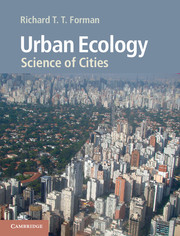Book contents
- Frontmatter
- Dedication
- Contents
- Foreword
- Preface
- Acknowledgments
- Part I Framework
- Part II Ecological features
- 4 Urban soil and chemicals
- 5 Urban air
- 6 Urban water systems
- 7 Urban water bodies
- 8 Urban habitat, vegetation, plants
- 9 Urban wildlife
- Part III Urban features
- Epilogue
- Appendix A Positive and negative attributes of an urban region
- Appendix B Equations
- References
- Index
6 - Urban water systems
Published online by Cambridge University Press: 05 June 2014
- Frontmatter
- Dedication
- Contents
- Foreword
- Preface
- Acknowledgments
- Part I Framework
- Part II Ecological features
- 4 Urban soil and chemicals
- 5 Urban air
- 6 Urban water systems
- 7 Urban water bodies
- 8 Urban habitat, vegetation, plants
- 9 Urban wildlife
- Part III Urban features
- Epilogue
- Appendix A Positive and negative attributes of an urban region
- Appendix B Equations
- References
- Index
Summary
We never miss the water till the well runs dry.
James Kelly, A Complete Collection of Scottish Proverbs, 1721Tortuous, fissured, unpaved, crackling, interrupted by quagmires, broken by fantastic bends, rising and falling illogically, fetid, savage, wild, submerged in obscurity, with scars on its pavements and gashes on its walls, appalling, seen retrospectively, such was the ancient sewer of Paris. Ramifications in every direction, crossings of trenches, branchings, multiple forkings, stars as if in mines, cul-de-sacs, arches covered with saltpeter, foul cesspools, a cabby ooze on the walls, drops falling from the ceiling, darkness; nothing equaled the horror of this old voiding crypt, Babylonian digestive apparatus, cavern, grave, gulf pierced with streets, titanic molehill in which the mind seems to see prowling through shadows, in the excrement that has been splendor, that enormous blind mole, the past. … Today the sewer is neat, cold, straight, correct. … Do not trust in it too much, however. Miasmas still inhabit it.
Victor Hugo, Les Misérables, 1862No place even resembles the water flows of an urban area. We have straight, fast predictable flows over hard surfaces and through pipes. Streams are channelized, even disappearing into pipes and “magically” reappearing. Rain brings down the rich chemical mix arcing over us. Stormwater quickly washes the city clean, carrying away dust from streets and sidewalks and an even richer cornucopia of chemicals from buildings and other surfaces. A water-supply pipe squirts a small addition of hyper-clean water (except for chlorine, fluorine, and other chemicals) into the system. Another pipe or ditch system carries off and partially cleans the eternal concentration of human wastes so they don’t build up in the city. River water bulging with sediment and countless pollutants often squeezes through a city, sometimes with roaring floods, which clean out the accumulated toxics from industrial sites and carry off inappropriately located urban structures.
In contrast, out in natural land water generally flows more slowly, less predictably, and in crooked routes full of objects creating friction. The chemical mix washed down by rain and carried over surfaces is typically rather depauperate, often dominated by inorganic macro-nutrients. No pipe squirts in hyper-clean water, and no pipes carry off tubfuls of human wastewater. Clear water fills most rivers, while streams appear curvy, heterogeneous, often nutrient-poor, and seem to flow unendingly.
- Type
- Chapter
- Information
- Urban EcologyScience of Cities, pp. 149 - 174Publisher: Cambridge University PressPrint publication year: 2014



